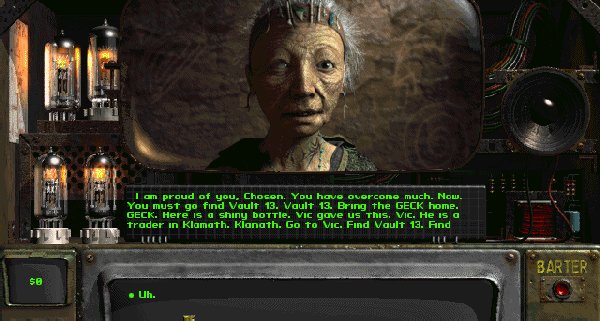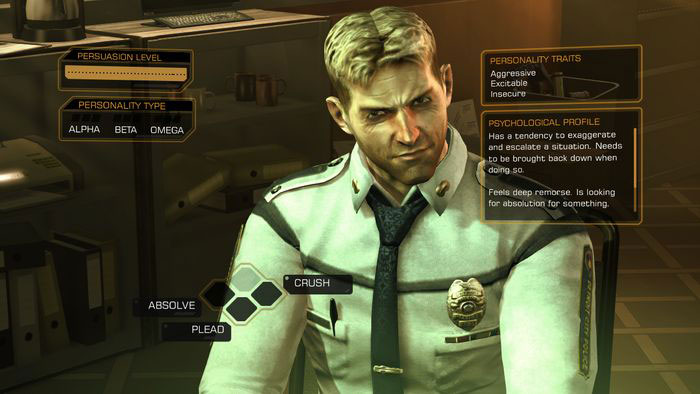About the Deus Ex dialogue system and real mechanics in board games
Deus Ex Human Revolution is a work of art in the best traditions of cyberpunk, a kind of IT-RPG. The game is excellent and stylish with a cool plot and a lot of elaborate details. But the most cool thing in my opinion is the system of dialogues as a mechanic.
Now I will explain what the matter is. Look at these two screenshots: the first from Fallout II, the second from the new Deus Ex.

The good old Dialog dialogue system

in Deus Ex with the social module installed in the head
The classic dialogs in both Fallout II and Deus Ex are very similar: you just have to choose the answer options. In both cases, if you want to convince the interlocutor, you need to think through a line of behavior. You can put pressure on someone, apologize to someone, tell someone directly and so on.
The interesting thing happens if you get a social perk in Fallout or install a social module in Deus Ex. In the first case, the dialogs will not change, but all the answers will be highlighted in colors: blue - the opponent will like it, red will make him angry and so on. Everything is simple and no extra knowledge is needed.
But in Deus Ex everything is cooler. Here you are not given the right or wrong branches. You see the character’s character fluctuations (alpha-beta-omega) during the dialogue, plus from time to time breathing activity and pupil activity are shown using special charts. Plus profile and personality traits. Then you need to use this information.

The social module determines the alpha response by heartbeat.
What has changed?First, you see how data is collected. You preliminary “calibrate” the interlocutor, exploring the type of character and modus operandi according to his microreactions. And then you make a decision about what is the best way to influence - which specific strategy. In this case, the module creates new dialogs (branches that would not exist without it), but does not change the results - in most cases the same could be achieved simply by choosing the right options in the usual way.
And now the coolest. This means that the player receives a tool that allows you to evaluate actions yourself. That is, not the game does it for him as in the second Fallout, but the player himself uses his personal knowledge.
What is the result?Deeper Immersion. The dialogs are more spectacular (in the game world - a person speaks, and you study his breathing with the help of sensors, insanely beautiful drawings of lung diagrams on the screen). Then comes the decision. At the level of mechanics - showing a number of signs, from which it is necessary to catch the reference and make a choice. At the setting level - a completely holistic system, which is interesting to interact with.
Now imagine that the game would not interpret these data for you (as it is now reflected in the character graph). And the player would have had to rely on his own knowledge of psychology: why did the opponent suddenly breathe faster, why did the pupils dilate, why did he reach for a cigarette, why did his voice become higher and so on.
The game could give a solid simulation of real dialogue(now it’s almost achieved), and the player would feel that his knowledge of psychology is important for his proper conduct. Another thing is that the creators must be competent enough to prescribe this.
But if we do so, we fall out of the plane of the game into the plane of interaction with real objects. In our example, the problem cannot be solved by game methods - you need a real player skill that cannot be "rocked" in the game. At first glance, it gives some hardcore like drawing a card on paper instead of a convenient auto-card in the game, maintaining a paper log again (try not to write down the password in the Vanger from the secret world - you have to get it the second time!) Instead of a convenient auto-magazine.
But at the same time, in games for a long time there are already mathematical problems (we need real mathematics), and other attempts to use real skills.
The fact is that in board games we have a sea of everything where interaction is required outside the plane of the game. There are many examples: from simple skill games like Medved (where you need to grab a log for speed, and the person with the best reaction has the advantage) to classical diplomacy in strategies where the advantage is over the more trained in terms of impact. And, of course, it is worth mentioning the Mafia and the Resistance, where all-all-all things in the game are built around the ability to negotiate players. That is, mechanics boldly climb into the real world and work there. The reaction and behavior of players is still easy to predict. That is, such exits beyond the plane of the game itself are the norm. Moreover, every second game is almost initially designed for casuals, that is, deep specialized training is not required.
From counterexamples, I recall how two Japanese were disqualified at once because they determined at the MTG tournament who would be the first to go running to the wall of the hall. The first to run - the first to go. The reason - "unsportsmanlike behavior" - the more physically fit had the advantage.
Returning to the dialogue system. In my opinion, Deus Ex has something magical and new. At least in its infancy.
PS Yes, and the game is good and very atmospheric. If you haven’t seen it, I advise you. Just do not kill yourself working days.
Now I will explain what the matter is. Look at these two screenshots: the first from Fallout II, the second from the new Deus Ex.

The good old Dialog dialogue system

in Deus Ex with the social module installed in the head
The classic dialogs in both Fallout II and Deus Ex are very similar: you just have to choose the answer options. In both cases, if you want to convince the interlocutor, you need to think through a line of behavior. You can put pressure on someone, apologize to someone, tell someone directly and so on.
The interesting thing happens if you get a social perk in Fallout or install a social module in Deus Ex. In the first case, the dialogs will not change, but all the answers will be highlighted in colors: blue - the opponent will like it, red will make him angry and so on. Everything is simple and no extra knowledge is needed.
But in Deus Ex everything is cooler. Here you are not given the right or wrong branches. You see the character’s character fluctuations (alpha-beta-omega) during the dialogue, plus from time to time breathing activity and pupil activity are shown using special charts. Plus profile and personality traits. Then you need to use this information.

The social module determines the alpha response by heartbeat.
What has changed?First, you see how data is collected. You preliminary “calibrate” the interlocutor, exploring the type of character and modus operandi according to his microreactions. And then you make a decision about what is the best way to influence - which specific strategy. In this case, the module creates new dialogs (branches that would not exist without it), but does not change the results - in most cases the same could be achieved simply by choosing the right options in the usual way.
And now the coolest. This means that the player receives a tool that allows you to evaluate actions yourself. That is, not the game does it for him as in the second Fallout, but the player himself uses his personal knowledge.
What is the result?Deeper Immersion. The dialogs are more spectacular (in the game world - a person speaks, and you study his breathing with the help of sensors, insanely beautiful drawings of lung diagrams on the screen). Then comes the decision. At the level of mechanics - showing a number of signs, from which it is necessary to catch the reference and make a choice. At the setting level - a completely holistic system, which is interesting to interact with.
Now imagine that the game would not interpret these data for you (as it is now reflected in the character graph). And the player would have had to rely on his own knowledge of psychology: why did the opponent suddenly breathe faster, why did the pupils dilate, why did he reach for a cigarette, why did his voice become higher and so on.
The game could give a solid simulation of real dialogue(now it’s almost achieved), and the player would feel that his knowledge of psychology is important for his proper conduct. Another thing is that the creators must be competent enough to prescribe this.
But if we do so, we fall out of the plane of the game into the plane of interaction with real objects. In our example, the problem cannot be solved by game methods - you need a real player skill that cannot be "rocked" in the game. At first glance, it gives some hardcore like drawing a card on paper instead of a convenient auto-card in the game, maintaining a paper log again (try not to write down the password in the Vanger from the secret world - you have to get it the second time!) Instead of a convenient auto-magazine.
But at the same time, in games for a long time there are already mathematical problems (we need real mathematics), and other attempts to use real skills.
And here it is appropriate to look at the desktops
The fact is that in board games we have a sea of everything where interaction is required outside the plane of the game. There are many examples: from simple skill games like Medved (where you need to grab a log for speed, and the person with the best reaction has the advantage) to classical diplomacy in strategies where the advantage is over the more trained in terms of impact. And, of course, it is worth mentioning the Mafia and the Resistance, where all-all-all things in the game are built around the ability to negotiate players. That is, mechanics boldly climb into the real world and work there. The reaction and behavior of players is still easy to predict. That is, such exits beyond the plane of the game itself are the norm. Moreover, every second game is almost initially designed for casuals, that is, deep specialized training is not required.
From counterexamples, I recall how two Japanese were disqualified at once because they determined at the MTG tournament who would be the first to go running to the wall of the hall. The first to run - the first to go. The reason - "unsportsmanlike behavior" - the more physically fit had the advantage.
Returning to the dialogue system. In my opinion, Deus Ex has something magical and new. At least in its infancy.
PS Yes, and the game is good and very atmospheric. If you haven’t seen it, I advise you. Just do not kill yourself working days.
